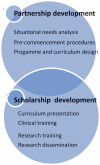Advancing nursing scholarship: the Mozambique model
- PMID: 28771092
- PMCID: PMC5645685
- DOI: 10.1080/16549716.2017.1351116
Advancing nursing scholarship: the Mozambique model
Abstract
Background: Despite the importance of Human Resources for Health for the development and functioning of health systems worldwide, many countries continue to be plagued by poor health systems and a lack of adequate health care. Health systems failures may be attributed to both quantitative and qualitative nursing shortages including the lack of advanced skills to lead health initiatives, to conduct research and to educate other nurses. The response by development partners is usually framed around the production of skilled nurses through the processes of up-skilling and scaling-up. The outcome is expanded practice but with scant attention to the professional advancement of nurses.
Objectives: In this paper we present a two-phased capacity development model that adopted professionalization strategies to advance nursing scholarship and consequent postgraduate specialization of the first cohort of nurses in Mozambique. The main objectives were to: develop and implement a clinical course work master's degree in nursing; and ensure sustainability by capacitating the host institution to continue with the master's programme following graduation.
Methods: Rigorous processes for project discussions, negotiations and monitoring were necessary amid limited resources and a challenging political climate. Forging in-country partnerships, sustaining alliances and government investment are thus key to the success of the Mozambique model.
Outcomes: Notwithstanding some difficulties, the process unfolded over a five-year period, graduating the first cohort of 11 senior nurses with a master's degree, specializing either in critical care and trauma nursing, or maternal and neonatal health.
Conclusions: Bridging the skills gap between generalist and specialist nurses is essential for them to manage complex and high acuity cases and to reverse associated morbidity and mortality. We conclude that this model serves as a professionalization strategy to advance nurses' scholarship of clinical practice, research and teaching.
Keywords: Capacity development; higher education; nursing; partnership; scholarship.
Figures
References
-
- Mozambique Country Operational Plan 2014 PEPFAR. [cited 2016. August 2]. Available from: http://www.pepfar.gov/documents/organization/240261.pdf
MeSH terms
LinkOut - more resources
Full Text Sources
Other Literature Sources
Miscellaneous



